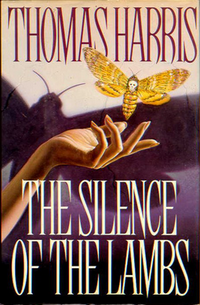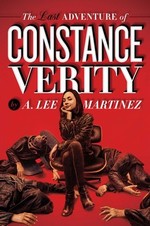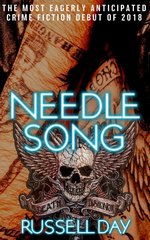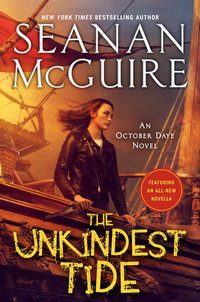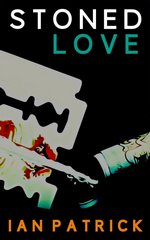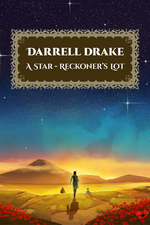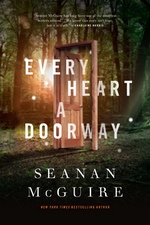|
I’d like to take this opportunity to thank you for all the support you’ve given me and the thoughtful and open minded reviews you’ve written. Without good people like yourself indie presses wouldn’t exist. We can write as much as we want but it’s down to people like you to get the word out.
Finally you the reader. If you’ve got this far you’ve given up your precious time to find out a little bit more about what I think. But it’s just my opinion and you must feel free to take or leave as you wish. In a world of billions to have your time to listen is a very rare privilege. One I don’t take for granted. Many thanks for all your support.
|
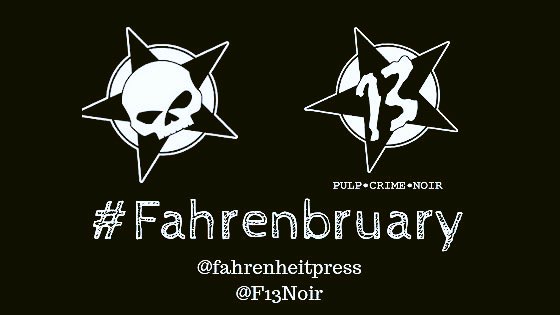
by Ian Patrick
Series: Sam Batford, #2
Kindle Edition, 246 pg.
Fahrenheit Press, 2018
Read: September 14 – 15, 2018

I need to blend in where I shouldn’t belong. The best undercover officers have no air of ego or the appearance of a police mannequin. After all, one sniff of pig and your ass is bacon. I’ve no intention of being served up at any criminal’s barbecue.
How do you follow up 2017’s Rubicon, the twisty, morally ambiguous (at best) tale of an undercover cop? Well, if you’re Ian Patrick, you do it by bringing that shady cop back and putting him in a tighter spot with threats (physical, legal and career) on all sides.
Sam Batford has had a little time off to recuperate and get his head on straight after Rubicon — hopefully giving the heat on him a little time to cool down, and maybe give Big H time to move on from the setback Batford dealt him.
The Met has a new assignment for him — working with the same DCI as he did last time, DCI Klara Winter. During the last assignment, she wasn’t sure she could trust Batford — now she’s convinced that she can’t. In fact, while she wouldn’t mind taking down the criminals that Batford infiltrates, her main objective is to arrest Batford and his Superintendent Mike Hall, a pair she’s convinced are dirty. She’s right, of course, but that’s beside the point.
Ostensibly, Batford’s assignment is to infiltrate a group that’s supposedly planning a major armed robbery and will need a driver of some sorts. But the clock is ticking so he doesn’t have time to do this carefully. Winter has someone already embedded with the crew giving her information, and their primary purpose is to get dirt on Batford and Hall. Which sounds good, but when you get a couple of guys as cagey and wily as this pair, that’s no easy task.
At the same time, Hall’s told Batford that between family and work stresses, this is his last hurrah. Now, he’d like to start his retirement with a sizeable bankroll, and trusts that Batford will find a way to make the both of them some money from just whatever it is that this crew is up to. The crew’s leader, who goes by the cuddly moniker of Razor, is a long-time “unauthorized informant” of Hall’s. And now, he’s sending Batford in to get him arrested. Which seems odd, but it does give Hall enough of an inside track to help Batford.
So, essentially, Batford needs to find a way to get rich off these criminals, hopefully get enough evidence for some arrests, stop them from pulling off whatever they’re trying to — and avoid getting arrested himself (not that he knows he’s being targeted for that). Oh, yeah, and Big H hasn’t moved on, forgotten or forgiven him — in fact, he has an active contract out for Batford’s life, and there are people trying to collect on that. Sounds like a pretty rough time for him.
In Rubicon, there was a question (at least for me) throughout — just how bent is Batford? Will he actually do law enforcement, or is he just out for himself? What are the limits for him? Will he have any success in either his criminal or police activities? In Stoned Love, the questions are different — we know he’s bent pretty far. So it’s just will Batford survive? Will Winter arrest him? Will Hall use him to save his own skin? Will Razor do something to him? Will Big H’s killers eliminate him?
This changed the dynamic of the book for me, and made it a lot easier for me to enjoy this novel and cheer on Batford. There’s no moral or legal gray area any more. Like Michael Corleone or Hannibal Lechter, Sam Batford is a despicable character that the reader wants to find success. Thankfully, he’s nervy enough and clever enough, that there’s a pretty good chance that he will. At least for a while.
Winter is manipulative, deceptive and devoted more to her career than anything else. But she’s, technically, the good guy here. Everyone else is the kind of criminal that the police are supposed to stop, not become. But because we’re in Batford’s head, and Winter’s primarily seen as an obstacle for him to overcome, the reader roots for him and against her — knowing the whole time that it should be the other way around.
There’s frequent and repeated commentary on the effects of Brexit, budget cuts, personnel cuts and other moves by the British government that are impacting the police services throughout the novel. Patrick is a former police officer and if these aren’t his actual views coming forth through Batford, he’s a better author than I think. If Batford’s diagnosis of what’s going on with the police in Britain is accurate, it sounds pretty frightening.
It’s a minor thing — I only noticed this as I started to write this post, and I’ve recently had a bad experience with reading a novel that couldn’t pick a verb tense, so I was primed — but Patrick’s use of the present tense for these books is a subtle, and incredibly effective way of cranking up the tension, propelling the action forward, and pushing the reader to keep up with the pace of the book. I should’ve picked up on it with Rubicon, and am a little annoyed with myself for taking this long to notice.
I enjoyed Rubicon, but I appreciated what Patrick was doing and how he was doing it more. With Stoned Love, I still admired and appreciated his skill and aims, but I enjoyed the story more — I resented things like work and family for preventing me from finishing this as quickly as I wanted to, and absolutely relished an airline flight that meant I had uninterrupted reading time*. I think Stoned Love is an all-around better effort (which is saying something) and makes me very excited to see what comes from Ian Patrick next.
Not everyone enjoys reading books where the police are just as dirty as those they’re supposed to be stopping — and I understand that — but if you’re someone who can embrace a tarnished knight, someone who seems to be law enforcement malgré lui, you don’t want to waste any more time, get your hands on Rubicon and Stoned Love and prepare to be impressed.
—
* I also really appreciated having this to focus on rather than the fact that I was in a giant metal tube that has no business being that far off the ground, but that’s another story.
—–


I bought this shortly after it was released, and then let it collect e-dust on my e-reader, and pretty much used Damp Pebbles’ Book Tour for this as my excuse to read it. I wasn’t over the moon with this one, but I liked it a lot. And then I spent months thinking about it until the sequel came out. Batford’s the kind of character that will not move out of your headspace like any respectable character does when you start a new book. Rather, he’ll take up residence — scratch that, he’ll squat there, not allowing the lease holder to get comfortable sharing the space with him…. I think this metaphor has gotten out of hand, so I’m going to shut up and get on with the post.
—
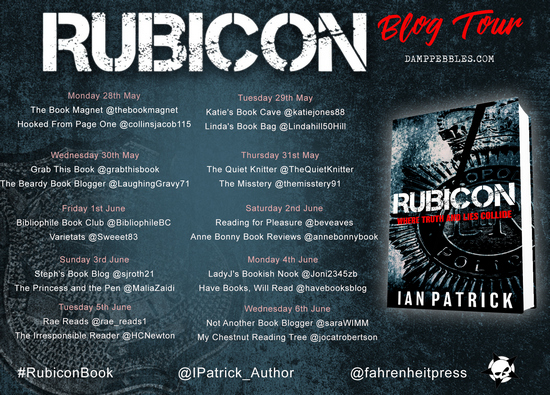
by Ian Patrick
Series: Sam Batford, #1
Kindle Edition, 232 pg.
Fahrenheit Press, 2017
Read: May 31 – June 2, 2018

. . . there’s no money in policing unless you cross the line.
But that doesn’t mean that Sam Batford isn’t going to try.
Batford is an undercover police officer who’s after a kingpin of some repute and his guns and drugs importing. DCI Klara Winter is a no-nonsense head of a task force going after the same kingpin, Big H, more directly — phone taps, applying pressure to associates, interrogations, etc. Batford is assigned to her task force to supplement their intelligence. Neither want this assignment, and work to undermine it immediately. They do actually help each other out — but it’s almost despite their best efforts. Their mutual dislike, distrust and antagonism is one of the more interesting dynamics that I’ve run across lately.
We see most of the novel through Batford’s eyes, with the occasional glimpse from Winter’s perspective. It doesn’t take much to get a strong sense of Winter’s personality and thought process. Just from the volume, the reader ends up seeing things Batford’s way — whether or not they should.
Batford infiltrates Big H’s organization — at least to a degree — for one job. A large one, no doubt, one that would secure Winter’s career (and would do his own some favors). Like most undercover officers (especially in fiction), he cuts many legal and ethical corners to do so. There’s some question — as there should be — whether or not Big H really trusts him, and the constant testing, evaluation and insecurity makes for great reading — it’s an atmosphere you can almost feel through the words.
So Batford is doing what he can to get enough information to take down Big H, to gain his trust (and therefore access), to disrupt the flow of drugs and guns — and mostly to stay alive. If he can find a way to make a little money while he’s at it . . . well, he might as well. Winter just wants enough evidence to make some arrests — and maybe some headlines — so she can get the budget to keep her team working.
This is not a book for the squeamish — there are a few scenes I know that would cause some of my friends and readers to throw the book down in disgust (the same scenes will cause other friends/readers to fist pump their excitement — I’m not sure which of these bothers me more). There’s one scene in particular that made me think of the dental scene from Marathon Man (I’ve never watched the movie just in case they nail that scene from the novel).
There were two . . . I don’t want to say problems for me, but things that kept me from going over the moon with Rubicon: Batford works his way into this assignment by worming his way in to the trust of one Big H’s associates while they’re in Bali. Do Metropolitan Police Undercover Officers really get to globe-trot the way that Batford does? Is that a bit of Artistic License? Is it a sign of just how far outside the lines that Batford colors? Does it tell us that he’s not just a Metropolitan Police Officer? It’s a minor point, I admit — and it’s really easy to accept as kosher (but that doesn’t mean I don’t wonder), because watching Batford’s machinations there is fascinating.
Secondly, Batford displays a very particular vocabulary — I’m not sure if it’s London slang, or Ian Patrick-slang. I could believe either. I will admit that there were periods that the slang got in the way of the story. That’s probably on me — and some of it is Shaw’s two countries separated by a common language phenomenon. With a little bit of work, and a small amount of guesswork (and a willingness to go back and revisit a passage later), it was all accessible enough and perspicuous.
There’s a lot about this book that I’m not sure about — I’ve been chewing on it for a couple of days, and it’s going to take a few more at least. Patrick’s characters take a little chewing, I think. It’d be easy to put Batford in the “murky anti-hero” category and move on — but I’m not sure he fits there; I’m even less sure where Winter fits — she’s not the straight-laced cop you’re at first tempted to label her, nor is she just the figure that makes life difficult for our anti-hero to do what he wants (although she functions pretty well that way). But even if/when I decide how to categorize these two — then I have to decide what I think of them as these characters — are they good people? No. That’s easy. Are they good fictional beings in their particular roles? My gut says yes, and my brain leans that way, but I’m still working on that.
Either way, I’m enjoying chewing on the novel and these ideas — and I’m definitely getting my money’s worth out of this book, just having to think about it this much.
There is part of this evaluation that’s easy — the writing? Gripping. The pacing? Once it gets going, it’s a runaway train that you’re just hoping you can hang on to long enough to get through to the end. The narrative voice is as strong as you could ask, and even when you’re thinking this cop might be more deserving of a being handcuffed on his way to a long incarceration than his targets, you’ll need to hear his singular perspective on the events around him.
Strong writing (some of my favorite sentences of the year are in this book), characters that demand thinking about, a plot that you can’t wrap up in a tidy bow — this isn’t your typical thriller. Whether it’s your cup of tea or not, it’s one that you won’t forget easily.
—–


by Ian Patrick
Series: Sam Batford, #2Kindle Edition, 246 pg.
Fahrenheit Press, 2018
Read: September 14 – 15, 2018

I need to blend in where I shouldn’t belong. The best undercover officers have no air of ego or the appearance of a police mannequin. After all, one sniff of pig and your ass is bacon. I’ve no intention of being served up at any criminal’s barbecue.
How do you follow up 2017’s Rubicon, the twisty, morally ambiguous (at best) tale of an undercover cop? Well, if you’re Ian Patrick, you do it by bringing that shady cop back and putting him in a tighter spot with threats (physical, legal and career) on all sides.
Sam Batford has had a little time off to recuperate and get his head on straight after Rubicon — hopefully giving the heat on him a little time to cool down, and maybe give Big H time to move on from the setback Batford dealt him.
The Met has a new assignment for him — working with the same DCI as he did last time, DCI Klara Winter. During the last assignment, she wasn’t sure she could trust Batford — now she’s convinced that she can’t. In fact, while she wouldn’t mind taking down the criminals that Batford infiltrates, her main objective is to arrest Batford and his Superintendent Mike Hall, a pair she’s convinced are dirty. She’s right, of course, but that’s beside the point.
Ostensibly, Batford’s assignment is to infiltrate a group that’s supposedly planning a major armed robbery and will need a driver of some sorts. But the clock is ticking so he doesn’t have time to do this carefully. Winter has someone already embedded with the crew giving her information, and their primary purpose is to get dirt on Batford and Hall. Which sounds good, but when you get a couple of guys as cagey and wily as this pair, that’s no easy task.
At the same time, Hall’s told Batford that between family and work stresses, this is his last hurrah. Now, he’d like to start his retirement with a sizeable bankroll, and trusts that Batford will find a way to make the both of them some money from just whatever it is that this crew is up to. The crew’s leader, who goes by the cuddly moniker of Razor, is a long-time “unauthorized informant” of Hall’s. And now, he’s sending Batford in to get him arrested. Which seems odd, but it does give Hall enough of an inside track to help Batford.
So, essentially, Batford needs to find a way to get rich off these criminals, hopefully get enough evidence for some arrests, stop them from pulling off whatever they’re trying to — and avoid getting arrested himself (not that he knows he’s being targeted for that). Oh, yeah, and Big H hasn’t moved on, forgotten or forgiven him — in fact, he has an active contract out for Batford’s life, and there are people trying to collect on that. Sounds like a pretty rough time for him.
In Rubicon, there was a question (at least for me) throughout — just how bent is Batford? Will he actually do law enforcement, or is he just out for himself? What are the limits for him? Will he have any success in either his criminal or police activities? In Stoned Love, the questions are different — we know he’s bent pretty far. So it’s just will Batford survive? Will Winter arrest him? Will Hall use him to save his own skin? Will Razor do something to him? Will Big H’s killers eliminate him?
This changed the dynamic of the book for me, and made it a lot easier for me to enjoy this novel and cheer on Batford. There’s no moral or legal gray area any more. Like Michael Corleone or Hannibal Lechter, Sam Batford is a despicable character that the reader wants to find success. Thankfully, he’s nervy enough and clever enough, that there’s a pretty good chance that he will. At least for a while.
Winter is manipulative, deceptive and devoted more to her career than anything else. But she’s, technically, the good guy here. Everyone else is the kind of criminal that the police are supposed to stop, not become. But because we’re in Batford’s head, and Winter’s primarily seen as an obstacle for him to overcome, the reader roots for him and against her — knowing the whole time that it should be the other way around.
There’s frequent and repeated commentary on the effects of Brexit, budget cuts, personnel cuts and other moves by the British government that are impacting the police services throughout the novel. Patrick is a former police officer and if these aren’t his actual views coming forth through Batford, he’s a better author than I think. If Batford’s diagnosis of what’s going on with the police in Britain is accurate, it sounds pretty frightening.
It’s a minor thing — I only noticed this as I started to write this post, and I’ve recently had a bad experience with reading a novel that couldn’t pick a verb tense, so I was primed — but Patrick’s use of the present tense for these books is a subtle, and incredibly effective way of cranking up the tension, propelling the action forward, and pushing the reader to keep up with the pace of the book. I should’ve picked up on it with Rubicon, and am a little annoyed with myself for taking this long to notice.
I enjoyed Rubicon, but I appreciated what Patrick was doing and how he was doing it more. With Stoned Love, I still admired and appreciated his skill and aims, but I enjoyed the story more — I resented things like work and family for preventing me from finishing this as quickly as I wanted to, and absolutely relished an airline flight that meant I had uninterrupted reading time*. I think Stoned Love is an all-around better effort (which is saying something) and makes me very excited to see what comes from Ian Patrick next.
Not everyone enjoys reading books where the police are just as dirty as those they’re supposed to be stopping — and I understand that — but if you’re someone who can embrace a tarnished knight, someone who seems to be law enforcement malgré lui, you don’t want to waste any more time, get your hands on Rubicon and Stoned Love and prepare to be impressed.
—
* I also really appreciated having this to focus on rather than the fact that I was in a giant metal tube that has no business being that far off the ground, but that’s another story.
—–


by Ian Patrick
Series: Sam Batford, #1Kindle Edition, 232 pg.
Fahrenheit Press, 2017
Read: May 31 – June 2, 2018

. . . there’s no money in policing unless you cross the line.
But that doesn’t mean that Sam Batford isn’t going to try.
Batford is an undercover police officer who’s after a kingpin of some repute and his guns and drugs importing. DCI Klara Winter is a no-nonsense head of a task force going after the same kingpin, Big H, more directly — phone taps, applying pressure to associates, interrogations, etc. Batford is assigned to her task force to supplement their intelligence. Neither want this assignment, and work to undermine it immediately. They do actually help each other out — but it’s almost despite their best efforts. Their mutual dislike, distrust and antagonism is one of the more interesting dynamics that I’ve run across lately.
We see most of the novel through Batford’s eyes, with the occasional glimpse from Winter’s perspective. It doesn’t take much to get a strong sense of Winter’s personality and thought process. Just from the volume, the reader ends up seeing things Batford’s way — whether or not they should.
Batford infiltrates Big H’s organization — at least to a degree — for one job. A large one, no doubt, one that would secure Winter’s career (and would do his own some favors). Like most undercover officers (especially in fiction), he cuts many legal and ethical corners to do so. There’s some question — as there should be — whether or not Big H really trusts him, and the constant testing, evaluation and insecurity makes for great reading — it’s an atmosphere you can almost feel through the words.
So Batford is doing what he can to get enough information to take down Big H, to gain his trust (and therefore access), to disrupt the flow of drugs and guns — and mostly to stay alive. If he can find a way to make a little money while he’s at it . . . well, he might as well. Winter just wants enough evidence to make some arrests — and maybe some headlines — so she can get the budget to keep her team working.
This is not a book for the squeamish — there are a few scenes I know that would cause some of my friends and readers to throw the book down in disgust (the same scenes will cause other friends/readers to fist pump their excitement — I’m not sure which of these bothers me more). There’s one scene in particular that made me think of the dental scene from Marathon Man (I’ve never watched the movie just in case they nail that scene from the novel).
There were two . . . I don’t want to say problems for me, but things that kept me from going over the moon with Rubicon: Batford works his way into this assignment by worming his way in to the trust of one Big H’s associates while they’re in Bali. Do Metropolitan Police Undercover Officers really get to globe-trot the way that Batford does? Is that a bit of Artistic License? Is it a sign of just how far outside the lines that Batford colors? Does it tell us that he’s not just a Metropolitan Police Officer? It’s a minor point, I admit — and it’s really easy to accept as kosher (but that doesn’t mean I don’t wonder), because watching Batford’s machinations there is fascinating.
Secondly, Batford displays a very particular vocabulary — I’m not sure if it’s London slang, or Ian Patrick-slang. I could believe either. I will admit that there were periods that the slang got in the way of the story. That’s probably on me — and some of it is Shaw’s two countries separated by a common language phenomenon. With a little bit of work, and a small amount of guesswork (and a willingness to go back and revisit a passage later), it was all accessible enough and perspicuous.
There’s a lot about this book that I’m not sure about — I’ve been chewing on it for a couple of days, and it’s going to take a few more at least. Patrick’s characters take a little chewing, I think. It’d be easy to put Batford in the “murky anti-hero” category and move on — but I’m not sure he fits there; I’m even less sure where Winter fits — she’s not the straight-laced cop you’re at first tempted to label her, nor is she just the figure that makes life difficult for our anti-hero to do what he wants (although she functions pretty well that way). But even if/when I decide how to categorize these two — then I have to decide what I think of them as these characters — are they good people? No. That’s easy. Are they good fictional beings in their particular roles? My gut says yes, and my brain leans that way, but I’m still working on that.
Either way, I’m enjoying chewing on the novel and these ideas — and I’m definitely getting my money’s worth out of this book, just having to think about it this much.
There is part of this evaluation that’s easy — the writing? Gripping. The pacing? Once it gets going, it’s a runaway train that you’re just hoping you can hang on to long enough to get through to the end. The narrative voice is as strong as you could ask, and even when you’re thinking this cop might be more deserving of a being handcuffed on his way to a long incarceration than his targets, you’ll need to hear his singular perspective on the events around him.
Strong writing (some of my favorite sentences of the year are in this book), characters that demand thinking about, a plot that you can’t wrap up in a tidy bow — this isn’t your typical thriller. Whether it’s your cup of tea or not, it’s one that you won’t forget easily.
—–

|
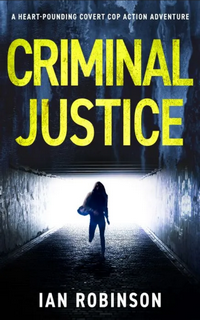 I was very excited this week to see that the good people over at The Good Folks have republished Ian Robinson’s dynamite debut, with a new title and with out a nom de plume. You can go read what I said about Criminal Justice‘s first incarnation back in 2018, here. I wanted to do something to celebrate this release and hopefully draw some eyes to Robinson’s work, so we hastily set up this Q&A. It’s a little different than my usual M.O. (it’s been years since I read the book for one thing, so I couldn’t ask a lot of specifics). I like the results, hopefully you do, too.
I was very excited this week to see that the good people over at The Good Folks have republished Ian Robinson’s dynamite debut, with a new title and with out a nom de plume. You can go read what I said about Criminal Justice‘s first incarnation back in 2018, here. I wanted to do something to celebrate this release and hopefully draw some eyes to Robinson’s work, so we hastily set up this Q&A. It’s a little different than my usual M.O. (it’s been years since I read the book for one thing, so I couldn’t ask a lot of specifics). I like the results, hopefully you do, too. 



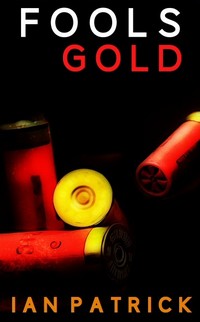




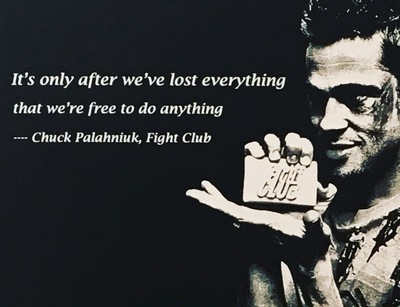
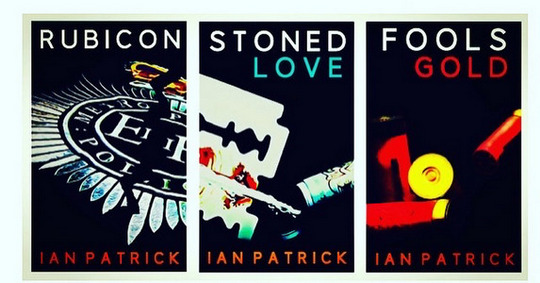
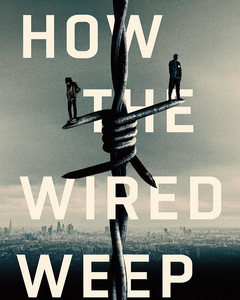
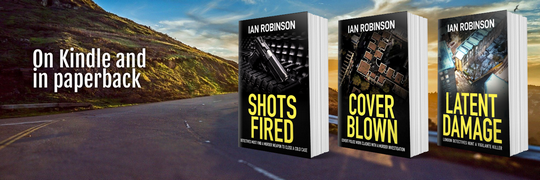
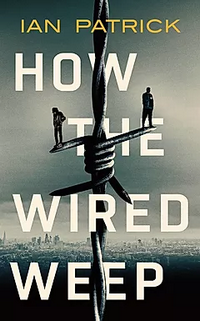

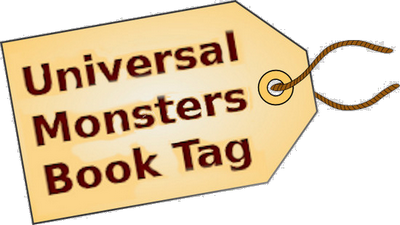
 Dracula: a book with a charismatic villain
Dracula: a book with a charismatic villain